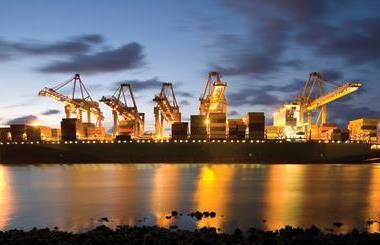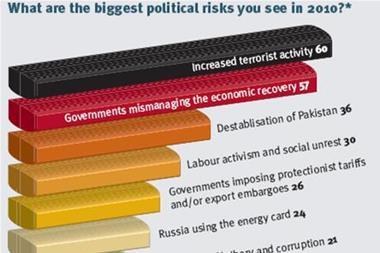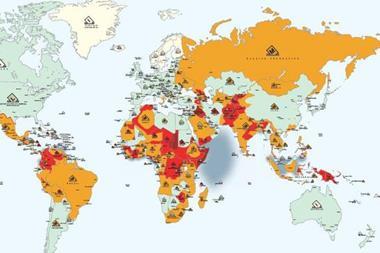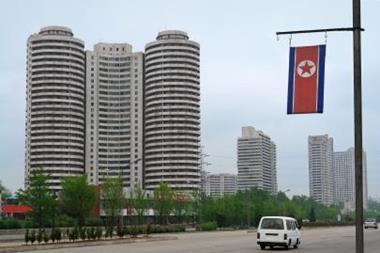Companies face increased pressure by US-based lobbyists to cut business ties with the Iranian regime
Western firms that do business in Iran have come under increased pressure by US lobbyists in March 2010. They are being urged to cut business with Iranian banks and insurance companies, as well as companies linked to the powerful Revolutionary Guard and senior members of government. Such pressure is likely to increase as Tehran continues to resist the UN’s nuclear watchdog – the International Atomic Energy Agency (IAEA) – as it urges Iran to come clean over its nuclear programme and adopt measures to guarantee that it will not push ahead to develop nuclear weapons.
The political clout enjoyed by US lobby groups that oppose the Iranian regime’s nuclear policy has made it increasingly difficult for US and other Western companies to conduct business in Iran. The most active lobby group is the New-York based United Against Nuclear Iran (UANI), which is placing hundreds of US and foreign companies – including the likes of Total, Petrobras, Coca-Cola and KPMG- under pressure to cut their business dealings in Iran. This is despite the fact that such business remains legal under US and international law. Dennis Ross and Richard Holbrooke – both senior members of the Obama administration’s Middle East team – are amongst UANI’s founders, testifying to the outfit’s clout. Companies that ignore UANI risk further negative publicity and possible shareholder divestment.
The level of pressure from lobby groups, coupled with the international attention that Tehran has drawn to itself over its intransigence on the nuclear issue, has caused a number of firms to announce that they have or will cut their business dealings with Iran. This includes oil major Royal Dutch Shell, which announced in March 2010 that it has stopped selling refined petroleum to Iran, as well as oil trading firms Vitol, Glencore and Trafigura, which cut gasoline sales to the country that same month. Together, the three oil-trading companies met half of Iran’s daily gasoline imports of between 130,000 – 150,000 barrels per day.
Oil and commodities trading companies have not been the only entities to review their business strategies in face of mounting pressure to isolate the Iranian regime. Ingersoll-Rand plc, a maker of cooling systems and air compressors for transport and buildings, announced in early March that it will no longer allow subsidiaries to sell products ultimately destined for Iran. Caterpillar, the world’s largest maker of mining and construction equipment, likewise said in early March that it would bar its non-US subsidiaries from accepting orders for products sold by third-party independent resellers destined for delivery to Iran. These announcements come after Siemens, the German engineering conglomerate, said in January 2010 that it would not sign new deals in Iran.
The insurance sector appears to be following the trend. In February 2010, German insurers Allianz and Munch Re said they had stopped all the remaining insurance business in the country. Significantly, that same month, Lloyd’s of London, the British insurance and reinsurance market, said it would end its cover for refined oil shipments to Iran if the US passes new legislation on Iranian sanctions.
Resisting pressure
This is not to suggest that all foreign firms that operate in Iran are currently considering whether to review their investments. Some firms - particularly non-Western companies which do not face the same pressure or reputational risks as their Western counterparts - are moving ahead to expand their business in Iran. Notably, in March 2010, Russia’s state-owned Gazprom confirmed it was in talks with the Iranian government to develop the Azar oil field. The month before, Gazprom announced that it had agreed with Tehran to develop more phases of Iran’s giant South Pars gas field. Brazil has also signalled that it is likely to enhance its business and commercial relations with the Islamic Republic. Notably, during Iranian President Mahmoud Ahmadinejad’s November 2009 visit to Brazil, the two countries agreed to share technical expertise on energy projects. The Iranians at the time said that they might offer Brazil’s state-controlled Petrobas additional incentives for further investment.
Such investment plans reflect the extent to which Iran is continuing to engage in business with foreign entities. A 2010 survey conducted by the Times newspaper revealed that of the 74 firms that do business both with Iran and the US government, 49 continue to business there with no announced plans to leave the country.
An ambiguous US policy
That Iran has enjoyed strong business links with foreign businesses derives partly from the long-standing ambiguity of US policy on sanctions against the Islamic Republic. The federal government reportedly awarded over US$107bn in grants, contract payments and other benefits over the past ten years to multinational US firms and foreign companies while they were doing business in Iran, according to US records. The amount includes almost US$15bn paid to companies that violated US sanctions law by making large investments in Iran which helped the country develop its oil and gas reserves.
The provision of such grants comes despite the 1996 Iran Sanctions Act, which was devised in response to Iran’s stepped up nuclear programme and its support for violent anti-Israeli groups Hizbollah, Hamas and Palestinian Islamic Jihad. The Act aims to punish foreign companies investing over US$20m (in any given year) to develop and manage Iran’s oil and gas fields. Under the act, offending companies risk losing government contracts, may be prevented from receiving export-import loans, or may be barred from obtaining US bank loans over US$10m in any given year. They may also be prevented from exporting their goods to the US. However, the US has been reluctant to enforce the act out of fear that it may anger and alienate US allies.
Washington’s reluctance to punish companies from allied nations is illustrated in a number of examples. South Korean engineering firm Daelim for instance won a US$700m contract to upgrade an Iranian oil refinery in 2007, and yet the firm was still awarded a US$111m contract by the US army to build housing in a military base in South Korea. Another example is Royal Dutch Shell which singed a US$800m deal to develop Iran’s Soroush and Nowruz oil fields in 1999, following which the company secured contract payments and grants worth over US$11bn from the US federal government.
Tougher sanctions?
However, Washington’s approach to sanctions is likely to become less ambiguous in the coming months. Both the US House of Representatives and the Senate have approved different versions of a bill to allow US President Obama to impose tight sanctions on Iran’s gasoline suppliers (the two houses must combine their two versions into one before it becomes law). Although Democrats and Republicans alike have been campaigning to tighten US sanctions on Iran, the White House has urged them to hold back so as to provide more time for engagement with Tehran and in order not to complicate the US government’s efforts to reach an international agreement on a sanctions regime in the UN. US politicians are mindful of the fact that although Iran sits on approximately 11% of the world’s proven oil reserves, it imports as much as 40% of its supplies of refined oil due to the dilapidated state of its refineries. Although wanting to maximise international pressure on Iran, US lawmakers are aware that the bill could backfire and antagonise US allies and trading partners. The final form of legislation may therefore create exceptions for companies from countries which have their own robust sanctions in place.
Pushing a strong international sanctions regime through the UN Security Council is proving more difficult as two of the Council’s veto-wielding permanent members – namely Russia and China – are loath to adopt a UN resolution that would severely isolate the Iranian regime. In mid-March Chinese Foreign Minister Yang Jiechi said that Beijing does not view crippling sanctions as the “fundamental solution” to the dispute with Iran – a country which supplies 11% of China’s total oil imports according to Chinese government figures. While reluctant to impose stringent sanctions, Moscow appears to be losing patience with Tehran. Russian President Medvedev said in early-March that he still hoped to avoid new punitive measures, but added that Russia would not wait forever and would be willing to consider whether to introduce sanctions if necessary so long as they were targeted.
Sanctions alone are unlikely to end the Iranian regime’s nuclear ambitions. Iranian’s Supreme Leader Ali Khamenei and President Mahmoud Ahmadinejad have shown little inclination to freeze or reverse the country’s nuclear development plans – raising the prospect of an Israeli air assault against the Iran’s nuclear facilities. In retaliation, Tehran may stoke conflict in Afghanistan, Iraq and Israel through proxy forces. Washington nonetheless hopes that conflict can be averted and that a stringent sanctions regime combined with an open door for negotiations will convince Tehran to reconsider its nuclear policy. However, such measures will cause an increasing number of Western companies to cut business and commercial links with Iran in face of the increased reputational and financial risk of being associated with the Iranian regime.
Anthony Skinner is Principal Analyst at the global risks advisory firm, Maplecroft
.



















No comments yet